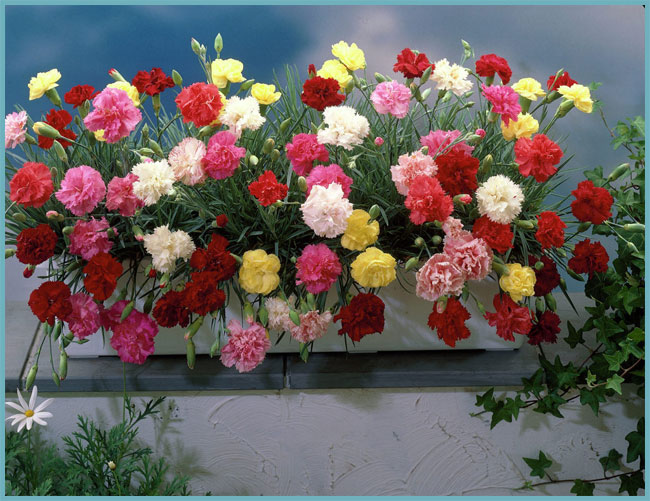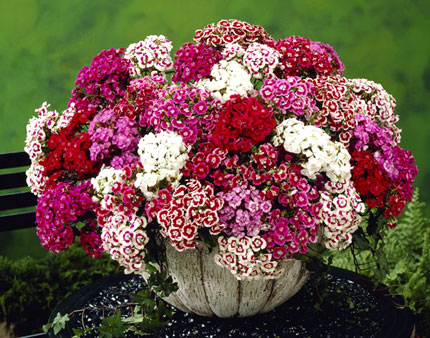 Many gardeners prefer to grow Turkish carnation in their flowerbed because of its unpretentiousness in care, plentiful and long flowering, and bright color of the petals. This type of carnation is equivalent to ornamental plants, so it is very important to know when to plant Turkish clove and how to grow it from seeds. If you follow all the recommendations, the result will not only not keep you waiting, but will also bring a lot of positive impressions.
Many gardeners prefer to grow Turkish carnation in their flowerbed because of its unpretentiousness in care, plentiful and long flowering, and bright color of the petals. This type of carnation is equivalent to ornamental plants, so it is very important to know when to plant Turkish clove and how to grow it from seeds. If you follow all the recommendations, the result will not only not keep you waiting, but will also bring a lot of positive impressions.
You can buy good seeds of Turkish clove this link.
The main characteristics of the plant
To understand what Turkish clove is, you can see a photo of the plant and get acquainted with its main characteristics. After all, something sets this flower apart from the rest.
The height of the flower varies from 15 to 20 centimeters, if the variety of Turkish carnation is undersized. If the variety is tall, then the plant can reach a height of 60 to 80 centimeters. Inflorescences, in which the flower is collected, have a diameter of 10 to 12 centimeters. The plant can give monophonic buds, or tri-color tri-color. The color scheme will also please fans of everything bright and diverse, because you can grow in the flower beds from seeds of Turkish Carnation of white, red, pink and burgundy flowers, it all depends on the variety.
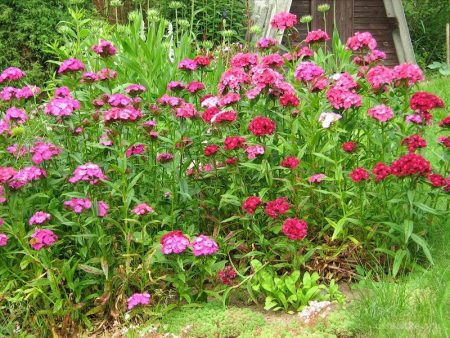
Plant seeds
First of all, you should decide when to plant Turkish Carnation, and only then start hanging from the seeds. If at first the plant is planted on seedlings. That is best done in March-April. If you plant seeds immediately in open ground, then you must begin this procedure in May-June. How to grow Phlox perennial: planting and care photo.
To grow Turkish clove from seeds, it is not enough to know when to plant a plant (photo and video), you need to prepare the soil for it in advance. A few weeks before the seeds are planted, you need to dig the earth to a depth of 20-25 seeds. Then it must be watered, and then covered with polyethylene. After 14 weeks, the polyethylene is removed, and then you can already begin to plant the seeds in the soil.
You can sow the seeds of Turkish cloves in October, but under such conditions, the seeds should be dry, like the ground, otherwise the plant will die in the winter. Despite the fact that the flower is immune to cold, it is better to add peat mulch or humus to the soil for the winter, with a layer of 10 centimeters. In spring, the plant must be hidden from the first sunlight, in order to avoid burns to the plant, using covering material.
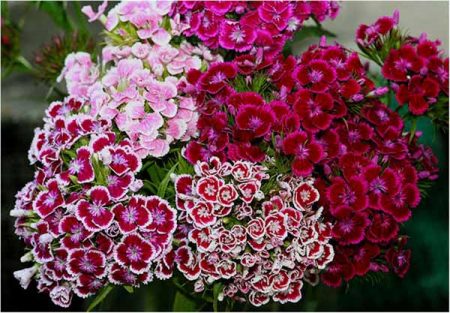
Seeds are planted in open ground in rows, the distance between which should be 15 centimeters. But between the seeds you must observe a distance of 0.5-2 centimeters. Depth is not embedded deep into the ground, one centimeter.
When the change is already in the ground, they must be pressed down with a layer of soil, and sprinkled with water at room temperature. Next, cover the plant with suitable material. After 10 days, you can already notice the first shoots.
Plant Care Rules
Elementary care will help to achieve bright and healthy flowers in the flowerbed in a short time! Cloves are poured twice a week, at the rate of 12 liters per square meter.If there is heat in the yard, you need to pay more attention to watering. But, at the same time, you can not overfill the plant, otherwise its root will begin to rot. To prevent the flow of water from damaging the delicate buds, the watering can should be tilted closer to the ground.
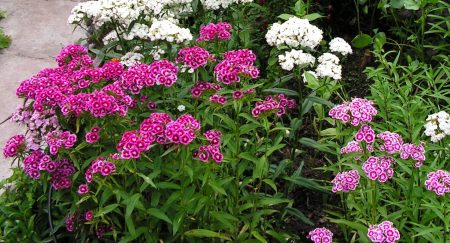
When the plant reaches a height mark of 10-12 centimeters, you need to carry out the first dressing with a solution of 10 liters of water and a tablespoon of nitrophoska and the same amount of fertilizer "Agricola Forward".
When the buds begin to form, the time has come for a second top dressing. This time you need to dissolve a tablespoon of potassium sulfate and superphosphate in 10 liters of water.
During flowering it is necessary to carry out the third top dressing. For 10 liters of water you need to take a tablespoon of fertilizer "Agricola for flowering plants." If you properly grow Turkish carnation from seeds, and observe the timing when to plant, then the plant will grow well, even if the soil does not quite meet the needs of the flower. Caring for Turkish cloves is very simple, but what a spectacular result!

